Saturday, 27. January 2007
Carter's speech
The streaming of the event:
http://www.brandeis.edu/offices/communications/events/200701carter.html
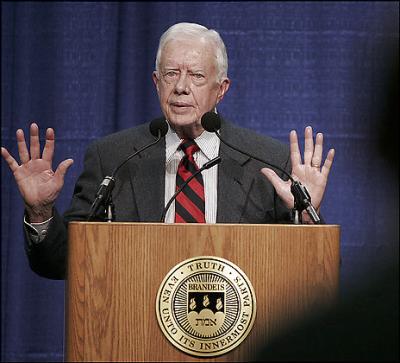
(Photo - Associated Press)
http://www.brandeis.edu/offices/communications/events/200701carter.html

(Photo - Associated Press)
ieva jusionyte, 13:14h
... link (0 Kommentare) ... comment
Wednesday, 24. January 2007
Media on Carter's visit
"The Boston Globe" article with additional information and video clips of the talk:
http://www.boston.com/news/local/articles/2007/01/24/carter_wins_applause_at_brandeis/
"The New York Times": http://www.nytimes.com/2007/01/24/us/24carter.html?_r=1&oref=slogin
CBS News: http://www.cbsnews.com/stories/2007/01/24/ap/national/mainD8MRDE7G0.shtml
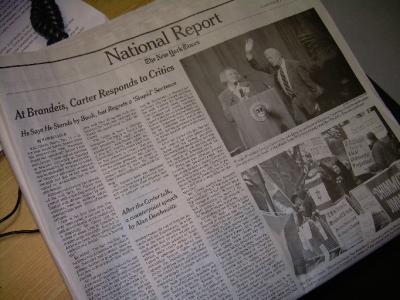
Moreover...
Read "Jimmy Carter's 'Peace' Mission To Brandeis" in the Washington Post: http://www.washingtonpost.com/wp-dyn/content/article/2007/01/23/AR2007012301668.html
Watch NECN's coverage of the addresses:
http://www.boston.com/partners/worldnow/necn.html?catID=80781&clipid=1189510&autoStart=true&mute=false&continuous=true
Watch CNN's coverage of the event:
http://www.cnn.com/video/partners/clickability/index.html?url=/video/politics/2007/01/24/costello.carter.apology.mxf.cnn
http://www.boston.com/news/local/articles/2007/01/24/carter_wins_applause_at_brandeis/
"The New York Times": http://www.nytimes.com/2007/01/24/us/24carter.html?_r=1&oref=slogin
CBS News: http://www.cbsnews.com/stories/2007/01/24/ap/national/mainD8MRDE7G0.shtml

Moreover...
Read "Jimmy Carter's 'Peace' Mission To Brandeis" in the Washington Post: http://www.washingtonpost.com/wp-dyn/content/article/2007/01/23/AR2007012301668.html
Watch NECN's coverage of the addresses:
http://www.boston.com/partners/worldnow/necn.html?catID=80781&clipid=1189510&autoStart=true&mute=false&continuous=true
Watch CNN's coverage of the event:
http://www.cnn.com/video/partners/clickability/index.html?url=/video/politics/2007/01/24/costello.carter.apology.mxf.cnn
ieva jusionyte, 10:03h
... link (0 Kommentare) ... comment
Tuesday, 23. January 2007
Carter on Palestine and Israel
Today the 39th President of the United States, Jimmy Carter, spoke to Brandeis students and faculty about his new book "Palestine: Peace, not Apartheid", which had been seen as a controversial account of Palestinian-Israeli relations.

The very fact that President Carter did come to Brandeis, a primarily American-Jewish university (even if a really good one), is important. At the beginning of his speach Carter - probably joking, but who knows - said that this was the second most exciting invitation to speak he has got in his life, the first one being when he was elected as President. And, he added, also the second most covered by the media. If Brandeis had not accepted him, it would have been a huge scandal, it even was already one in the articles published by "The Boston Globe" that revealed the divisions within Brandeis community between conservative administration, dependent on the Jewish sponsors, and its faculty and students. Therefore, this invitation, organized by student and faculty committee, not the administration (Brandeis president Jehuda Reinhartz did not attend the event at all), is a historical event for this university and also significant for the dialogue on the Middle East in the United States in general.
The gymnasium was full of students, the rest, who did not manage to get tickets to the event, had to remain outside with the banners either supporting or protesting. Well, what did he say? Carter's talk was really good, but even better were his answers to rather radical and straightforward questions by the students, one of them our Simon Puetzstueck from Bonn. The main ideas are clear... In order to reach peace in the Middle East Israel has to withdraw from the occupied Palestinian territories. The wall, which, as some student mentioned, "has proved to be successful means of countering terrorism as suicide attacks have decreased by 95 percent", would not be objected to by the international community and human rights organizations if it was on the so-called 'green line', but it does go deep into Palestinian lands, therefore, is not a border, is not justified at all. Moreover, America should not act unilaterally in the peace process, it must work together with the European Union, Russia and Israeli and Palestinian authorities, the latter represented by Abbas as the leader of all Palestinians. He also recalled the aftermath of Camp David accords and Oslo in 1993 and stated that it was Israel's fault that peace has not been reached until now since it never complied to the agreements written in black on white.
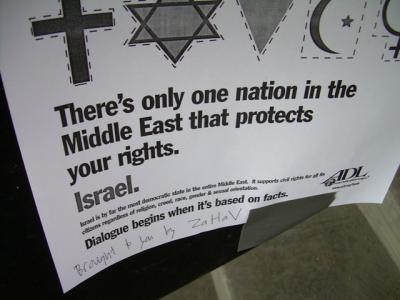
Reacting to some objecting questions twice Carter suggested to form a group of students and professors and just go and see for ourselves what the situation in the West Bank is. Palestinians are enclaved, banned from roads that are connecting the Izraeli settlements, deprived of basic human rights. There was some tone of teaching or educating in his speech. For example several times he repeated that the Jewish religion is based on the strive for justice and righteousness. And even refered to Brandeis as an institution named in honor of Supreme Court Justice Louis Brandeis. He believed, or maybe chose to believe, that students can understand what is just and what is unjust. And many times supported his statements with statistics, according to which both Izraelis and Palestinians more or less agree with peace accords, however, it is the radical forces that are to be blamed for violating them.
It really felt so good to listen to someone, who, even if he hasn't achieved a lot during his years in presidency, has enough experience to talk about the subject as well as does not lack intelligence and courage to talk openly. Surely, after some strong remarks the President was interrupted by loud applause, although it was clear that not all of Brandeis community agreed to what he was saying and quite a lot of them remained silent. Since morning the campaign againts his position was all over campus... dozens, if not hundreds, of white papers posted all over the place called for wearing "the star" or "the cross" as marks of identification and protest and continuously asked the question: "What is the only state in the Middle East that allows freedom of press?" The answer was written underneath: "Israel". However, Carter understood that his visit is a move forward for Brandeis as it legitimizes discussions on the subject which in many cases is forbidden. And, furthermore, he did talk honestly... "He is a good man", later said Simon. Just a good man and during his years in the White House too many abused this knowledge. In the question-answer session he even appologized for a sentence in his book that says that the suicide attacks should stop AFTER Israel recognized full Palestinian sovereignty and assured that in new editions this mistake will not be repeated. And, being as kind as he seemed, he promised to answer the rest of the questions, for which he did not have time, by e-mail:)
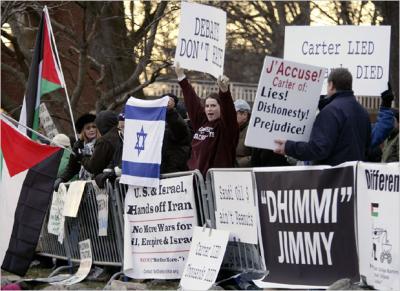
Since the initial idea of Brandeis administration had been to organize a debate between Carter and Harvard professor Alan Dershowitz, who is the most fierce critic of the book, but Carter did not agree, after the President left, Dershowitz did come to speak in the same place, even though for a slightly different audience. To deny everything and build up strong support and belief in Israel's politics. But who cares now? During his speech Carter said that Brandeis students do not need some Harvard professor to tell them what is right. And this sentence was welcomed with extremely loud applause. Probably the thought is immature, but maybe peace in the Middle East lies within the hands of young people like these, who have come from serving years in the Izraeli army, but are are so understanding and open for dialogue. Although not all are... Oh, what an interesting, complicated, but promising place Brandeis is!

The very fact that President Carter did come to Brandeis, a primarily American-Jewish university (even if a really good one), is important. At the beginning of his speach Carter - probably joking, but who knows - said that this was the second most exciting invitation to speak he has got in his life, the first one being when he was elected as President. And, he added, also the second most covered by the media. If Brandeis had not accepted him, it would have been a huge scandal, it even was already one in the articles published by "The Boston Globe" that revealed the divisions within Brandeis community between conservative administration, dependent on the Jewish sponsors, and its faculty and students. Therefore, this invitation, organized by student and faculty committee, not the administration (Brandeis president Jehuda Reinhartz did not attend the event at all), is a historical event for this university and also significant for the dialogue on the Middle East in the United States in general.
The gymnasium was full of students, the rest, who did not manage to get tickets to the event, had to remain outside with the banners either supporting or protesting. Well, what did he say? Carter's talk was really good, but even better were his answers to rather radical and straightforward questions by the students, one of them our Simon Puetzstueck from Bonn. The main ideas are clear... In order to reach peace in the Middle East Israel has to withdraw from the occupied Palestinian territories. The wall, which, as some student mentioned, "has proved to be successful means of countering terrorism as suicide attacks have decreased by 95 percent", would not be objected to by the international community and human rights organizations if it was on the so-called 'green line', but it does go deep into Palestinian lands, therefore, is not a border, is not justified at all. Moreover, America should not act unilaterally in the peace process, it must work together with the European Union, Russia and Israeli and Palestinian authorities, the latter represented by Abbas as the leader of all Palestinians. He also recalled the aftermath of Camp David accords and Oslo in 1993 and stated that it was Israel's fault that peace has not been reached until now since it never complied to the agreements written in black on white.

Reacting to some objecting questions twice Carter suggested to form a group of students and professors and just go and see for ourselves what the situation in the West Bank is. Palestinians are enclaved, banned from roads that are connecting the Izraeli settlements, deprived of basic human rights. There was some tone of teaching or educating in his speech. For example several times he repeated that the Jewish religion is based on the strive for justice and righteousness. And even refered to Brandeis as an institution named in honor of Supreme Court Justice Louis Brandeis. He believed, or maybe chose to believe, that students can understand what is just and what is unjust. And many times supported his statements with statistics, according to which both Izraelis and Palestinians more or less agree with peace accords, however, it is the radical forces that are to be blamed for violating them.
It really felt so good to listen to someone, who, even if he hasn't achieved a lot during his years in presidency, has enough experience to talk about the subject as well as does not lack intelligence and courage to talk openly. Surely, after some strong remarks the President was interrupted by loud applause, although it was clear that not all of Brandeis community agreed to what he was saying and quite a lot of them remained silent. Since morning the campaign againts his position was all over campus... dozens, if not hundreds, of white papers posted all over the place called for wearing "the star" or "the cross" as marks of identification and protest and continuously asked the question: "What is the only state in the Middle East that allows freedom of press?" The answer was written underneath: "Israel". However, Carter understood that his visit is a move forward for Brandeis as it legitimizes discussions on the subject which in many cases is forbidden. And, furthermore, he did talk honestly... "He is a good man", later said Simon. Just a good man and during his years in the White House too many abused this knowledge. In the question-answer session he even appologized for a sentence in his book that says that the suicide attacks should stop AFTER Israel recognized full Palestinian sovereignty and assured that in new editions this mistake will not be repeated. And, being as kind as he seemed, he promised to answer the rest of the questions, for which he did not have time, by e-mail:)

Since the initial idea of Brandeis administration had been to organize a debate between Carter and Harvard professor Alan Dershowitz, who is the most fierce critic of the book, but Carter did not agree, after the President left, Dershowitz did come to speak in the same place, even though for a slightly different audience. To deny everything and build up strong support and belief in Israel's politics. But who cares now? During his speech Carter said that Brandeis students do not need some Harvard professor to tell them what is right. And this sentence was welcomed with extremely loud applause. Probably the thought is immature, but maybe peace in the Middle East lies within the hands of young people like these, who have come from serving years in the Izraeli army, but are are so understanding and open for dialogue. Although not all are... Oh, what an interesting, complicated, but promising place Brandeis is!
ieva jusionyte, 21:10h
... link (0 Kommentare) ... comment
Friday, 12. January 2007
President Carter is coming
While I am travelling in Patagonia, a press release of January 11 cheered Brandeis people up:
---
President Jimmy Carter due to speak on campus
Released on January 11, 2007
Contact: Dennis Nealon 781-736-4205 nealon@brandeis.edu
WALTHAM, Mass., Jan. 10, 2007 -- Former President Jimmy Carter has accepted an invitation from a student and faculty committee at Brandeis University to speak on campus, perhaps as soon as Jan. 23, athough the date may be subject to change.
The Brandeis Faculty and Student Committee for the Visit of President Carter invited former President Carter to "address our community of students and scholars." The former President will give remarks and take questions from audience members. The event will last about one hour and is open to members of the university community only. Space, time and parking limitations, among other logistical concerns, make it impossible to offer public access to the event itself.
A Carter representative said today that the former President had accepted the invitation to visit Brandeis from the Faculty and Student Committee for the Visit of President Carter.
Details of the visit are being worked out with President Carter's staff and more information will be forthcoming. Expect another community email and updates on the main page.
---
---
President Jimmy Carter due to speak on campus
Released on January 11, 2007
Contact: Dennis Nealon 781-736-4205 nealon@brandeis.edu
WALTHAM, Mass., Jan. 10, 2007 -- Former President Jimmy Carter has accepted an invitation from a student and faculty committee at Brandeis University to speak on campus, perhaps as soon as Jan. 23, athough the date may be subject to change.
The Brandeis Faculty and Student Committee for the Visit of President Carter invited former President Carter to "address our community of students and scholars." The former President will give remarks and take questions from audience members. The event will last about one hour and is open to members of the university community only. Space, time and parking limitations, among other logistical concerns, make it impossible to offer public access to the event itself.
A Carter representative said today that the former President had accepted the invitation to visit Brandeis from the Faculty and Student Committee for the Visit of President Carter.
Details of the visit are being worked out with President Carter's staff and more information will be forthcoming. Expect another community email and updates on the main page.
---
ieva jusionyte, 05:51h
... link (0 Kommentare) ... comment
Tuesday, 26. December 2006
Brandeis and Carter
Brandeis University has appeared on the pages of “The Boston Globe” due to the planned Jimmy Carter’s visit to campus. In 2002 former U.S. president was awarded the Nobel Peace Prize for his efforts to find peaceful solutions to international conflicts, the most important of which was his role in negotiation of the crisis between Egypt and Israel back in 1970s. And in 2006 J. Carter published a controversial book entitled "Palestine: Peace Not Apartheid" where he critically reflects on Israeli politics in the Middle East. Because of this book chairman of the faculty senate at Brandeis invited J. Carter to speak on campus, however, to make it short, University president Jehuda Reinharz offered a condition that the guest would have to debate with a fiercest critic imaginable - Harvard Law School professor Alan Dershowitz (his op-ed on the issue was published on Harvard website - http://www.law.harvard.edu/news/2006/12/04_dershowitz.php), a suggestion which forced J. Carter to tell “The Boston Globe” a week or so ago that he declined the invitation.
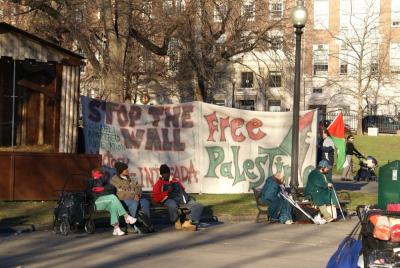
A scandal? A controversy? A University that is supposed to be a space of academic freedom and freedom of expression has shut the doors for an opinion that people who support this institution financially do not like? Yes, to some extent. But also more than that.
Brandeis University was founded by the American Jewish community in 1948, the same year that the state of Israel was counting its first days. It repeats that it is a non-sectarian institution. However… Although, most of the graduate students are not Jewish, a great number, if not the majority, of undergraduates either come from Israel or from the Jewish diaspora in the States. Moreover… Although the University is tolerant of any confessions at least in a sense that anyone can take time off during their religious celebrations, the general academic calendar is adjusted to the Jewish traditions, for example, instead of the Columbus day we have Yom Kippur as a no class day. But the issue is more complex than “the conservative Jewish community is the one to blame” and “The Boston Globe” has been right in pointing to the fractures that have been already proven to exist between the administration and the faculty on campus.
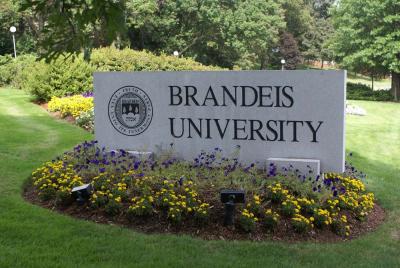
J. Reinharz, the voice and face of the University, at his inaugural address in 1995 said: "Brandeis has a clear and unambiguous identity that rests on four solid pillars: dedication to academic excellence, non sectarianism, a commitment to social action, and continuous sponsorship by the Jewish community." Leaving the issue of social justice and engagement aside as it will need more discussion some time, to many these goals might seem irreconcilable. But the fact of the matter is that Brandeis has been able to balance between academic freedom and financial allegiance to the Jewish diaspora quite successfully. Examples are abundant. Brandeis has a partnership with al-Quds University, which is an Arab institution. And Tony Kushner, who wrote the screenplay for the controversial Steven Spielberg's "Munich", received an honorary doctorate degree at Brandeis last May. Besides, Brandeis has one of the best programs in peace building in the country. However, there are examples of a rather different sort. Last May the exhibition of paintings by Palestinian children and teenagers was removed by a direct order of the president, who is believed to have been pressured by the sponsors. The exhibition went to M.I.T., Brandeis received negative coverage by “The Boston Globe” and the tension still exists between students, faculty members and the administration.
This tension has been enflamed again by the desired by some and unwished by others J. Carter's visit. Faculty members are still trying to convince him to come… they have been collecting donations for that, even though the former president said he would give a speech for free if the organizers could send a plane to take him from Georgia, which is a usual procedure for a figure of a status like his. Furthermore, one professor even suggested recommending the new book about Palestine for all the next year freshmen to read. The students, on their own right, have joined the faculty and the alumni in signing a petition calling for campus officials to bring J. Carter. After all the turmoil started and because of the attention it received from “The Boston Globe”, president J. Reinharz is now claiming that he would still like to see the former president and Nobel Peace Prize winner on campus. However, these are only the words of his spokesperson… And these are only the words so far. The show will go on and Brandeis will either take the open path of its ahead-looking faculty or turn the other way round and so declare challenging ideas and many promising students unwelcome.
Hopefully, to be continued…

A scandal? A controversy? A University that is supposed to be a space of academic freedom and freedom of expression has shut the doors for an opinion that people who support this institution financially do not like? Yes, to some extent. But also more than that.
Brandeis University was founded by the American Jewish community in 1948, the same year that the state of Israel was counting its first days. It repeats that it is a non-sectarian institution. However… Although, most of the graduate students are not Jewish, a great number, if not the majority, of undergraduates either come from Israel or from the Jewish diaspora in the States. Moreover… Although the University is tolerant of any confessions at least in a sense that anyone can take time off during their religious celebrations, the general academic calendar is adjusted to the Jewish traditions, for example, instead of the Columbus day we have Yom Kippur as a no class day. But the issue is more complex than “the conservative Jewish community is the one to blame” and “The Boston Globe” has been right in pointing to the fractures that have been already proven to exist between the administration and the faculty on campus.

J. Reinharz, the voice and face of the University, at his inaugural address in 1995 said: "Brandeis has a clear and unambiguous identity that rests on four solid pillars: dedication to academic excellence, non sectarianism, a commitment to social action, and continuous sponsorship by the Jewish community." Leaving the issue of social justice and engagement aside as it will need more discussion some time, to many these goals might seem irreconcilable. But the fact of the matter is that Brandeis has been able to balance between academic freedom and financial allegiance to the Jewish diaspora quite successfully. Examples are abundant. Brandeis has a partnership with al-Quds University, which is an Arab institution. And Tony Kushner, who wrote the screenplay for the controversial Steven Spielberg's "Munich", received an honorary doctorate degree at Brandeis last May. Besides, Brandeis has one of the best programs in peace building in the country. However, there are examples of a rather different sort. Last May the exhibition of paintings by Palestinian children and teenagers was removed by a direct order of the president, who is believed to have been pressured by the sponsors. The exhibition went to M.I.T., Brandeis received negative coverage by “The Boston Globe” and the tension still exists between students, faculty members and the administration.
This tension has been enflamed again by the desired by some and unwished by others J. Carter's visit. Faculty members are still trying to convince him to come… they have been collecting donations for that, even though the former president said he would give a speech for free if the organizers could send a plane to take him from Georgia, which is a usual procedure for a figure of a status like his. Furthermore, one professor even suggested recommending the new book about Palestine for all the next year freshmen to read. The students, on their own right, have joined the faculty and the alumni in signing a petition calling for campus officials to bring J. Carter. After all the turmoil started and because of the attention it received from “The Boston Globe”, president J. Reinharz is now claiming that he would still like to see the former president and Nobel Peace Prize winner on campus. However, these are only the words of his spokesperson… And these are only the words so far. The show will go on and Brandeis will either take the open path of its ahead-looking faculty or turn the other way round and so declare challenging ideas and many promising students unwelcome.
Hopefully, to be continued…
ieva jusionyte, 11:49h
... link (0 Kommentare) ... comment